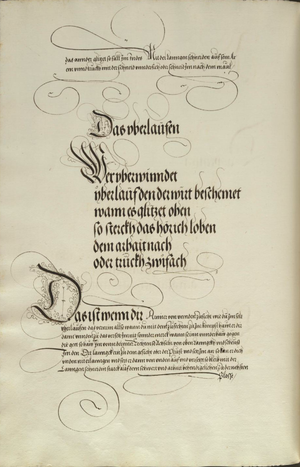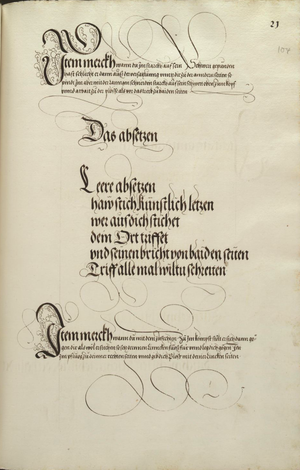|
|
You are not currently logged in. Are you accessing the unsecure (http) portal? Click here to switch to the secure portal. |
Difference between revisions of "User:Kendra Brown/Latin Lew/93r"
Jump to navigation
Jump to search
Kendra Brown (talk | contribs) |
Kendra Brown (talk | contribs) |
||
| Line 94: | Line 94: | ||
** 19-23: third practical example | ** 19-23: third practical example | ||
| − | == | + | == Missing zettel verses from PHM Dresden 104r (Dresden PDF page 45) == |
| + | [[File:MS_Dresd.C.93_104r.png|thumb|Page image]] | ||
=== German === | === German === | ||
| − | + | Das absetzen | |
| − | + | : | |
# Leere absetzen | # Leere absetzen | ||
# haw stich Kunstlich letzen | # haw stich Kunstlich letzen | ||
| Line 106: | Line 107: | ||
# Triff alle mal wiltu schreiten | # Triff alle mal wiltu schreiten | ||
| − | === English === | + | === English (Fritz) === |
| − | + | The setting-aside | |
| − | + | : | |
# Learn Absetzen (setting off). | # Learn Absetzen (setting off). | ||
# Foil artfully strikes and thrusts. | # Foil artfully strikes and thrusts. | ||
| Line 115: | Line 116: | ||
# the one who thrusts against you | # the one who thrusts against you | ||
# and his point will be broken by yours. | # and his point will be broken by yours. | ||
| − | # Hit from both sides each time you want to step. | + | # Hit from both sides each time you want to step. |
== 93r b == | == 93r b == | ||
Revision as of 04:13, 8 March 2021
Munich 93r / PDF page 31
Contents
Missing zettel verses from PHM Dresden 103v (Dresden PDF page 44)
German
Das vberlaufen
- Wer vberwinndet
- yberlauf den der wirt beschemet
- wann es glitzet oben
- so sterckh das horich loben
- dem arbait nach
- oder truckh zwifach
English (Fritz)
The overunning
- He who winds over
- will be put to shame by running over.
- When it glistens above
- be strong against it. I will hear this praised.
- Do your work
- or press twice
93r a
93r a Latin
- SUPERINIECTIO ENSIS.
- SI quis inferioribus Ictibus te fuerit adgressus,
- hoc modo contra te geras,
- si volveris commemorato habitu uti.
- Cum ad hostem accesseris,
- et is ab infernè contra te feriat,
- excipere ipsius impetum nolito,
- verum diligenter observato,
- cum ipsius ictus inferus tibi adpropinquarit,
- tu de humero dextro ictum porrectum ferias,
- indeque mucronem longiorem in faciem vel pectus adversarij propellas,
- nec non eum adplices,
- et proposito loco ensem adiungas,
- itaque fiet,
- ut infernè te adprehendere nequeat hostis.
- Si autem is ab infernè ensem levavit,
- tuumque impetum excipiat,
- longa tui ensis acies firmiter hostis ensi inhaereat[^1],
- atque inde celerrimè contra ipsius nuditatem proximam concertato.
- Isthuc tibi quoque observandum est,
- si firmiter ipsius ensem contigeris,
- atque is ex permunitione alterum latus tibi ferire conetur,
- tunc acie longa caput eius saucies,
- et aequè contra nuditatem ac prius labores utrinque.
93r a English
- The action of throwing/spreading/sprinkling the swords above
- If anyone approached you using strikes from below,
- you should conduct yourself in opposition in this way,
- if you [also?] wished to use the action which has been called to mind/mentioned.
- When you have come near to the opponent,
- and HE strikes against you from below(ly),
- you will refuse to take out his forward attack,
- [you] will truly observe carefully,
- when his low strike drew near to you,
- YOU would strike an extended strike from the right arm,
- and thence you would drive the adversary forward with the longer point in the face or chest,
- indeed come into contact with him,
- and if you would support/contact the sword in the intended place/location,
- and so it will be done,
- that the enemy is unable to seize you below(ly).
- If HE raised the sword away from below(ly) to the stated place,
- and he would take out your forward attack,
- the long edge of your sword stays connected firmly to the sword of the opponent,
- and thence you will quickly fight (contest) against his nearest opening.
- To that point it must likewise have been observed by you,
- if you have strongly contacted his sword,
- and HE tries to strike you out of the fortification on the other side,
- then you wound his head using the long edge,
- and you work equally on both sides against the opening and also the earlier [antecedent ?head?].
93r a notes
- [^1]: the underlying sense of this is something staying in place often in a somewhat negative way: words stuck in throat; following too close behind, failing to break through, getting stuck during a race. (It also has non-negative senses.) It makes more sense now that we've read "the long sharp edge of your sword" as the subject of the verb, not the object.
- Parallel construction, two targets, present in German
- organization:
- 1-3: outline
- 4-7: theoretical
- 8-14: practical example
- 15-18: second practical example
- 19-23: third practical example
Missing zettel verses from PHM Dresden 104r (Dresden PDF page 45)
German
Das absetzen
- Leere absetzen
- haw stich Kunstlich letzen
- wer auf dich stichet
- dem Ort triffet
- vnd seinen bricht von baiden seiten
- Triff alle mal wiltu schreiten
English (Fritz)
The setting-aside
- Learn Absetzen (setting off).
- Foil artfully strikes and thrusts.
- Your point will hit
- the one who thrusts against you
- and his point will be broken by yours.
- Hit from both sides each time you want to step.
93r b
93r b Latin (sandbox)
- REMOTIONIS HABITUS ET VSVS
- ID hoc modo exercebis,
- si ad adversarium proceßeris,
- atque is quasi pungere velit se constituerit,
- tu sinistrum pedem prepones,
- necnon versus ipsum in Aratrum co[m]ponas te,
- ex latere dextro tuo,
- nudumque latus hosti sinistrum praebeas,
- cum igitur nuditatem fodere conetur,
- ensem deflectas in latus sinistrum tuum versus ipsius ensem,
- et brevi acie,
- eius ensi coniungas,
- et ea conditione hostis impetum removeas mucrone tamen contra hostem porrecto,
- sinistro post dextro pedi coniuncto,
- faciem inde vel pectus fodias.
93r b English (sandbox)
- The gesture and use of shifting
- Any who will practice in this way,
- if you were to advance toward the adversary,
- and HE were to arrange himself as if he wanted to prick,
- YOU would have placed your left foot forward,
- and indeed, you would have composed yourself against that one in the plow,
- out of your right side,
- you should expose an openness and the left side to the enemy,
- When, therefore, he would attempt to stab the opening,
- you should turn the sword aside into your left side against his sword,
- and the short edge,
- you should join to his sword,
- and you shift the forward attack of the enemy in the situation still extending the point against the enemy,
- the right foot [already] having been joined behind the left,
- thence you should dig at the face or chest.
93r b notes
- confusing habitus line 1 I'm not sure about-- posture could also work
- parallel construction, two targets, present in german
- 11-12 need to be reversed for English, or just combined. wtf comma?
93r c
93r c Latin (Sandbox)
- ALIA FORMA PRAECEDENTIS.
- SI in Aratri habitu de latere dextro consistas,
- et adversarius nuditatem sinistri lateris supernè conetur ferire,
- tu sublato ense,
- contra ipsius Ictum in latus sinistrum eum convertas [page 32] capulo in forma Bovis pro facie tua constituto,
- alterum pedem si dextro adiunxeris,
- faciem inde vel pectus adversarij pungas,
- idque ex Aratro de latere sinistro facias.
93r c English (sandbox)
- Another form of going before/surpassing
- If you stand in the posture of the Plow from the right side,
- and the adversary attempts to strike the opening on the left side from above,
- YOU, having lifted the sword,
- turn it back against his strike in the left side with the sword hilt positioned in the form of the Ox in front of your face,
- if you have joined the second foot to the right,
- thence prick the face or the chest of the adversary,
- and you bring this about from the Plow away from the left side.
93r c notes
- parallel construction, two targets, in german


